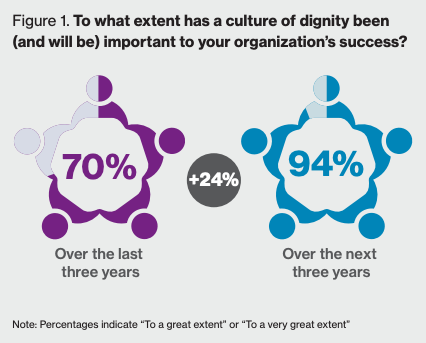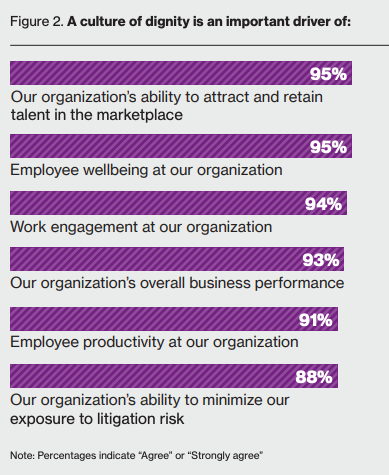Tags: Communication & Engagement, Employees, Diversity
Willis Towers Watson conducted this survey with the charity Robert F Kennedy Human Rights with the aim of measuring the perspectives of senior leaders engaged in aspects of building sustainable human capital strategies and healthy company cultures while improving organisational performance.
Willis Towers Watson conducted this survey in conjunction with the charity Robert F Kennedy Human Rights with the aim of measuring the perspectives of senior leaders engaged in aspects of building sustainable human capital strategies and healthy company cultures while improving organisational performance. The survey report also draws on previous findings from Willis Towers Watson’s 2019/2020 Global Benefits Attitudes Study in order to compare the perspectives of employees with those of their employers.
Respondents included executives from 129 large and midsize U.S. companies representing 1.4 million employees across a wide range of industries. Figures that cite employee perspectives are based on Willis Towers Watson’s 2019/2020 Global Benefits Attitudes Study, a survey of over 40,000 employees across 27 markets, including 8,000 employees in the U.S.
The definition of workplace dignity used encompasses three key dimensions:
- Dignity at work (employees are treated with respect in an environment free from marginalisation)
- Dignity in work (employees find meaning and purpose in their work)
- Dignity from work (employees feel respected because they are paid what they are worth, can sustain a suitable standard of living, and have the wellbeing to thrive now and in the future)
In other words, dignity is about being treated with kindness and respect, finding professional fulfilment, and maintaining material security and wellbeing.
Why Workplace Dignity Matters
- 95% of executive respondents said a culture of dignity is an important factor in employee wellbeing
- 94% said a culture of dignity is important in maintaining a high level of work engagement
- 93% said that workplace dignity is an important driver of overall business success.
Identifying the Barriers
Employers cite a range of barriers to developing a culture of dignity.
- 34% of respondents report that their organisation lacks the desired levels of diversity and representation, in terms of both demographic diversity and diversity of thought.
- 26% of organisations indicate that employees are not held accountable for their actions — in some cases possibly due to their role or level in the organisation.
- Almost a fifth (19%) of companies report that leaders and/or other employees isolate some employees, and bias in the organisation contributes to this issue.
- Fewer than 10% of organisations cite discrimination, bullying and harassment as barriers to workplace dignity.
Taking Action
- 87% of employers are ready to take action to build a culture of dignity over the next three years, up from 59% three years ago. There are a number of levers that can help organisations in achieving this goal.
- Creating a culture of dignity starts with leadership and a willingness to overcome organisational challenges to drive change. Presently, however, most employees agree that senior leadership plays only a supporting role in this area, behind other functions like HR.
- Training and communication is another key lever. The prevalence of different types of training relevant to workplace dignity varies significantly; 92% of respondents have training programmes around Codes of Conduct and business ethics broadly, while just 52% have training programmes on workplace bullying and unconscious bias.
- To ensure a culture of dignity that withstands changes in the nature of work, organisations can focus on reskilling and continuous learning. However, only 16% report they have programs in place to reskill any employees impacted by automation or outsourcing.
Measuring Progress
- Eight in ten employers track formal complaints from employees.
- Over three-fifths examine exit interviews (72%), and track undesirable turnover (67%) and legal actions (65%).
- 91% of organisations have prioritised building psychological safety over the next three years, yet only 20% of organisations use culture diagnostics to understand the current state.
How well do employees' and employers' views align?
Significant gaps exist between employee and employer perspectives in key areas:
- Over 80% of employers believe that employees are treated with dignity and respect regardless of their role, but only 65% of employees feel the same.
- Half of employees agree that senior leaders at their organisation have a sincere interest in their wellbeing, compared with 86% of employers.
- Only half of employees (51%) say their organisation encourages them to speak up, versus 79% of employers.
- 46% of employees and 65% of employers feel that their organisation facilitates a healthy integration of work and personal life.
Conclusions
The findings of the survey indicate that the positive effects of creating a culture of dignity on both purpose and profits are widely recognised. Many employers are also well aware of the key barriers to achieving a culture of dignity, and the levers they can use to make progress. In this sense, the outcome of the research is encouraging. Organisations know the benefits of creating a culture of dignity and many have a good idea of how to get there.
More concerning, however, is the significant discrepancy between employees' and employers' perspectives in terms of how much progress has already been made. It may be that steps taken by employers take time to deliver tangible results, leading to a delay in recognition. On the other hand, employers might be out of touch with their employees' wants and needs. These discrepancies highlight the importance of vertical communication and openness within an organisation.
With greater attention to the role of leadership, targeted training programmes, creating a sense of respect and openness, and using the right metrics to track progress, organisations can ensure all their people achieve a high degree of professional fulfilment and feel valued, respected, and materially secure. Businesses that achieve this will not only have created a culture to be proud of, but they will also reap rewards in terms of operational performance through increased loyalty and productivity.


